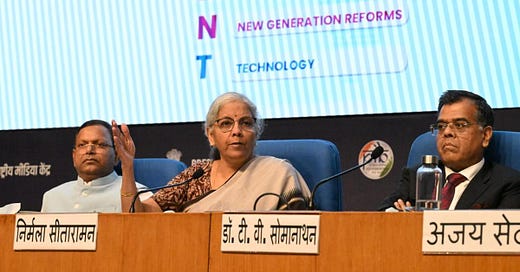Indirect Taxes in Budget 2024-25: GST and Customs Duties
Part 3 in our series: States now have to adapt to the "no-GST compensation" era and adjust their respective budgets accordingly. Or, approach the Central Finance Commission for revenue deficit grants.
Indirect Taxes in Budget 2024-25: GST and Customs Duties
The Budget Estimates for 2024-25 introduce notable changes and continue the Government's efforts to simplify and rationalise the tax regime. This article delves into the implications of the Budget on indirect taxes, particularly the Goods and Services Tax (GST) and customs duties.
Goods and Services Tax (GST)
Not much relief was expected regarding GST rates and policies since these fall under the jurisdiction of the GST Council, where all states are represented. Any state expecting the continuation of the GST compensation scheme, which officially ended in June 2024, will be disappointed. However, states can approach the Central Finance Commission for revenue deficit grants. The clear message to state GST machinery is that inefficiency in tax collection will not be compensated, as the old scheme guaranteed a 14% annual increase on a compound basis from the original base.
GST Achievements and Future Goals
GST has successfully reduced the tax burden on the common man, decreased compliance burdens, and lowered logistics costs for trade and industry, thereby enhancing revenues for both central and state governments. To further multiply these benefits, the government aims to simplify and rationalise the tax structure and expand GST to remaining sectors.
Customs Duties: Sector-Specific Proposals
Medicines and Medical Equipment
To provide relief to cancer patients, customs duties on three additional medicines will be fully exempted. Changes in Basic Customs Duty (BCD) on x-ray tubes and flat panel detectors for medical x-ray machines are proposed to align with domestic capacity additions under the Phased Manufacturing Programme.
Mobile Phones and Related Parts
With significant growth in domestic production and exports of mobile phones, the BCD on mobile phones, mobile Printed Circuit Board Assemblies (PCBA), and mobile chargers is proposed to be reduced to 15 per cent, benefiting consumers.
Critical Minerals
Customs duties on 25 critical minerals, such as lithium, copper, cobalt, and rare earth elements, will be fully exempted, with reduced BCD on two of them. This will support sectors like nuclear energy, renewable energy, space, defence, telecommunications, and high-tech electronics.
Solar Energy
To support energy transition efforts against climate change, the list of exempted capital goods for manufacturing solar cells and panels will be expanded. However, exemptions for customs duties on solar glass and tinned copper interconnect will not be extended due to sufficient domestic manufacturing capacity.
Marine Products
To enhance the competitiveness of India’s seafood exports, which reached an all-time high of over ₹60,000 crore, the BCD on certain broodstock, polychaete worms, shrimp, and fish feed will be reduced to 5 per cent. Various inputs for manufacturing shrimp and fish feed will also be exempt from customs duties.
Leather and Textile
To boost exports in the leather and textile sectors, the BCD on real down filling material from duck or goose will be reduced. Additions will be made to the list of exempted goods for manufacturing leather and textile garments, footwear, and other leather articles for export. To correct duty inversion, the BCD on methylene diphenyl diisocyanate (MDI) for manufacturing spandex yarn will be reduced from 7.5 to 5 per cent.
Precious Metals
To enhance domestic value addition in gold and precious metal jewellery, customs duties on gold and silver will be reduced to 6 per cent, and on platinum to 6.4 per cent.
Other Metals
To reduce production costs for steel and copper, the BCD on ferro nickel and blister copper will be removed. The nil BCD on ferrous scrap and nickel cathode and the concessional BCD of 2.5 per cent on copper scrap will continue.
Electronics
To increase value addition in the domestic electronics industry, the BCD on oxygen-free copper for manufacturing resistors will be removed, and certain parts for manufacturing connectors will be exempted.
Chemicals and Petrochemicals
To support existing and new capacities, the BCD on ammonium nitrate will be increased from 7.5 to 10 per cent.
Plastics
To curb imports of non-biodegradable and hazardous PVC flex banners, the BCD on them will be raised from 10 to 25 per cent.
Telecommunication Equipment
To incentivise domestic manufacturing, the BCD on the PCBA of specified telecom equipment will be increased from 10 to 15 per cent.
Trade Facilitation
To promote domestic aviation and marine repair, the period for exporting goods imported for repairs will be extended from six months to one year. The time limit for re-importing goods for repairs under warranty will be extended from three to five years.
In Summary
The Budget Estimates for 2024-25 continue to simplify and rationalise the indirect tax regime, with significant sector-specific proposals in customs duties aimed at supporting domestic manufacturing, enhancing export competitiveness, and simplifying the tax structure. While the GST regime remains largely unchanged, states are encouraged to improve their tax collection efficiency without relying on compensation from the Centre. The proposals, which involve ₹8,000 crore in revenue forgone in indirect taxes, reflect a balanced approach to fiscal management, promoting economic growth and reducing litigation while addressing sector-specific needs.





